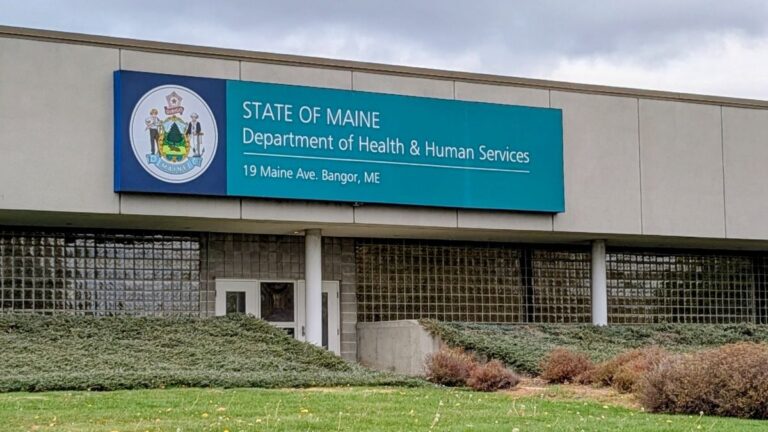AUGUSTA — A bill that would make it easier for people who contend they’ve been wrongly convicted to have their cases reviewed by a judge prompted emotional testimony before legislators on Thursday.
Anthony Sanborn teared up as he spoke at a Judiciary Committee hearing about spending 27 years of his life at the Maine State Prison, unable to be with his parents, wife and daughter, who is now 30. He was released from prison in 2017 when an eyewitness recanted her testimony.
“For the first 10 years I spent in prison, I thought someone would come forward, something would happen, they’d find the real killer, DNA would happen, the person would confess to the crime – whatever,” Sanborn recounted. “I watched the news every day, still thought I was part of the world for 10 years. After that 10 years, I knew I wasn’t part of the world. I wouldn’t watch the news anymore. I knew nothing good was coming my way, and I wasn’t getting any help.”
Jan Collins, assistant director of the Maine Prisoner Advocacy Coalition, also choked up as she testified about the suffering of innocent people in prison. She cited a Proceedings of the National Academy of Sciences study that estimated the rate of false convictions of defendants sentenced to death nationwide at 4.1 percent, a rate authors say likely was higher outside of death row because those cases receive less scrutiny.
According to Pine Tree Watch calculations, if 4.1 percent is accurate, 39 of the 944 prisoners in Maine State Prison and 95 of the 2,328 total number of people incarcerated in Maine would be innocent.
Judiciary Committee member Jeffrey Evangelos (I-Friendship) introduced LD 302 to remove some hurdles that convicted people claiming innocence face when trying to bring new evidence forward.
“It is not in the state of Maine’s interest to be holding innocent people in prison using the artificial devices of time limits and impossible-to-meet due diligence standards,” Evangelos told the committee.
As state law stands now, there are time limits for filing post-conviction review petitions and limits on the types of evidence that are admissible for different types of petitions.
Petitions based on DNA evidence, for example, must be filed within two years of a conviction or within two years of new DNA testing technology becoming available. Plus, only evidence related to the DNA sample is admissible. Petitions based on all other claims, including new evidence being discovered, have a one-year time limit for filing, measured from when the new evidence or other basis of the claim “could have been discovered through the exercise of due diligence.”
Prosecutors use these “shoulda, coulda” rules, as they’re known, to argue for dismissal of petitions on grounds that a defendant’s legal team should have found the evidence earlier.
Calling for a fairer approach
Evangelos’ proposal would create a new type of claim called “actual innocence,” which would be exempt from those time limits. Judges could then consider all evidence of innocence presented – no matter when it is found – and determine whether it’s significant enough to grant a new trial.
Meagan Sway, a lawyer for the ACLU of Maine, which supports the bill, explained the new claim in her testimony.
RELATED: Evidence of innocence? Passage of LD 302 could help Foster Bates, convicted of rape and murder in 2002, get new evidence heard in his case
“The law refers to a certain cohort of people as ‘actually innocent,’ and LD 302 uses this phrase well,” she said. “This means people who have been convicted following a fair trial but who are factually innocent nonetheless. We know that despite a fair trial that an innocent person can be convicted.”
Sway said federal courts don’t allow for claims of actual innocence and focus only on procedural errors as a valid reason to review a case. So state courts are the only recourse for a person hoping to have their case reviewed by using a claim of actual innocence.
“Please let them bring forth their evidence so it can be analyzed in a true and fair manner, not only so that we can be freed, but so our court systems can be validated and restored to good standing.”
— Hilary Hodgdon, speaking in favor of LD 302 on behalf of her husband, Ben Hodgdon, convicted of gross sexual assault but claiming his innocence
She urged the committee to review proposed amendments to the bill from the Innocence Project modeled after “actual innocence” laws passed in Utah in 2008 and Wyoming in 2018.
These amendments would set definitions, establish a process and set strict standards for the type of evidence that may be presented. They include a requirement that the evidence could not have been discovered with reasonable diligence at the time of trial, (not within a year of filing as in current law). It also provides that that requirement may be waived if the evidence was in fact not discovered, is material to the issue of innocence, and has never been presented to a court.
Evangelos gave his fellow committee members examples of wrongful convictions in Maine, describing Sanborn’s case and that of Vladek Filler, whose conviction of gross sexual assault was vacated because of prosecutorial misconduct and evidence that he had been falsely accused.
Also speaking in support of the bill was Hilary Hodgdon of Mount Desert Island, wife of former teacher Ben Hodgdon, who is serving a 3½-year sentence at the Maine Correctional Center for gross sexual assault. She alleges that the same prosecutor involved in Filler’s case tampered with and then destroyed exculpatory evidence in her husband’s case. Several audience members wore pins that read “Freedom and Justice for Ben Hodgdon.”
“There are others besides Filler and Ben that have not been so bold or resilient,” Hilary Hodgdon said. “Please let them bring forth their evidence so it can be analyzed in a true and fair manner, not only so that we can be freed, but so our court systems can be validated and restored to good standing.”
Efforts squelched in 2017
An earlier version of the same bill was killed in committee in 2017, after being strongly opposed by the Attorney General’s office, when was led by now-Governor Janet Mills, as well as the Maine Prosecutors Association.
At the bill’s work session in 2017, Criminal Division Chief Lisa Marchese of the AG’s office pointed to the Sanborn case as evidence that the current law is working and told the committee that the state had asked for bail at Sanborn’s hearing, which occurred earlier the same day. Transcripts show, however, that the state had fought against bail being granted.
Sanborn pointed out the discrepancy in a letter to the Portland Press Herald. At Thursday’s hearing he talked about being threatened to take a deal rather than proceed with his post-conviction review process after being released on bail.
“I spent 27 years in prison, wrongfully, and the prosecutors still fought on,” he said. “They wouldn’t admit it, with all the evidence in the world facing them.”
Evangelos believes Marchese’s statement led to the committee’s unanimous report that the bill “ought not to pass.” Last month, he filed a formal complaint to Attorney General Aaron Frey against Marchese for providing “materially false information to a Legislative Committee in an effort to kill extremely important legislation,” and wrote that the Judiciary Committee “relies on the Attorney General’s Office for timely and accurate information in its deliberation of important bills.”
The AG’s office declined to comment on the complaint beyond saying that it had been received.
At the hearing for LD 302 on Thursday, the Attorney General’s office continued to oppose the bill, along with the Criminal Law Advisory Commission.
Frey testified that the bill is unnecessary because Maine already has a process for case review for people who claim innocence based on new evidence. He told Judiciary Committee members that cases mentioned during the hearing show that the current law is working: Sanborn was present at the hearing rather than in prison, Filler had his conviction vacated and received a settlement, and Hodgdon is moving through the process now. He said no cases had been presented in which evidence couldn’t be introduced because it did not meet due-diligence standards.
He said that if such a case were to emerge, then “we can tinker with the existing statute to remove the due diligence standard or change the year timeframe,” rather than adopting LD 302. When pressed on that point, he clarified he did not agree to do those things and was speaking hypothetically.
Evangelos had told Pine Tree Watch in February that he’d cite case examples to show that wrongful conviction can occur, but he would refrain from speaking of other cases that could be affected by his bill.
‘I am not going to speak to any cases that are still undergoing review or possible appeal, because I don’t think it’s appropriate,” he said in February. “I’m not going to take a position on anyone’s guilt or innocence, because I don’t want to prejudice anything out in the public.”
A case LD 302 could impact
Pine Tree Watch is following one case that the Attorney General’s office is fighting to dismiss as time-barred, using the argument that the evidence on which it is based should have been discovered earlier than it was.
Maine State Prison inmate Foster Bates, convicted of the 1994 rape and murder of young mother Tammy Dickson in 2002 when DNA testing identified semen in Dickson’s body as his, is trying to have new evidence heard that emerged when a new witness came forward in 2014 alleging another man committed the crime.
Bates hired an investigator from the Innocence Project to look into her story. In the process, the investigator heard of another woman, Amanda Indigo of Lewiston, who might have information about the murder but would not speak to him. Bates’ lawyer subpoenaed Indigo to testify at his client’s 2016 post-conviction review hearing.
In her testimony, Indigo said she saw Bates leave Dickson’s apartment on the night of the murder after an apparent sexual encounter, and that after Bates left, she spoke to Dickson, who was fine. Her testimony also established that the man implicated by the first witness was at a party in the apartment across the hall from the victim that night.
But the hearing judge didn’t consider Indigo’s testimony – or a statement from the first witness – because it was a hearing on Bates’ DNA petition and that evidence wasn’t related to DNA. The petition was denied.
Bates filed a new petition based on Indigo’s testimony. Though he filed the petition within one year of her testimony, Assistant Attorney General Donald Macomber moved to dismiss it because her information should have been discovered earlier.
“The Innocence Project investigator could have interviewed (and probably did interview) Indigo, before the 6/13/16 DNA hearing,” he wrote in a March 15, 2019, brief in support of his motion to dismiss.
A Cumberland County Superior Court Justice currently is considering that motion to dismiss.
Balancing victim’s rights
Frey raised issue at Thursday’s hearing over the fact that the bill would remove a convicted person’s obligation to act within a “reasonable timeframe” upon the discovery of new evidence.
“I don’t think this bill is trying to deny victims the right to closure. This is about there is new evidence that suggests in order to be just, that we need to take a look at this again.”
— Rep. Rachel Talbot Ross (D-Portland), a Judicial Committee member
Earlier, committee member Rep. Rachel Talbot Ross (D-Portland) had asked about the purpose of the one-year time limit on bringing forth new evidence, and attorney Amy Fairfield, testifying in favor of the bill for the Maine Association of Criminal Defense Lawyers, speculated that the rule was developed in the interest of finality for victims.
Frey agreed.
“This process is not just about the defendant,” he said, “We also have to make sure that victims have some justice, too. Attention to what they went through needs to be factored into this balance. At what point is finality going to be appropriate?”
Ross challenged Frey on that point.
“Wouldn’t a victim, or victim’s family, want closure with the right person or persons held accountable for the crime that was committed, as opposed to just wanting closure to penalize anybody?
“I don’t think this bill is trying to deny victims the right to closure,” she said. “This is about there is new evidence that suggests in order to be just, that we need to take a look at this again.”
Frey said that the current law balances the rights of defendants and victims, and that as the committee considers changes, it should keep that balance in mind.
A work session has not yet been scheduled for LD 302.







